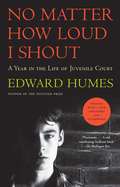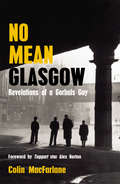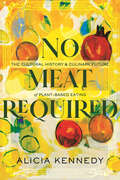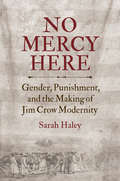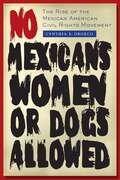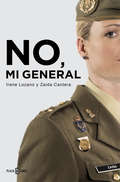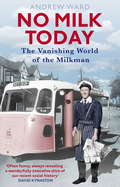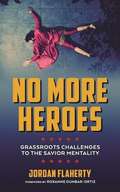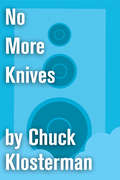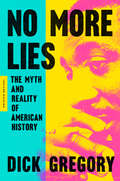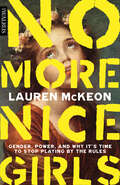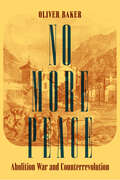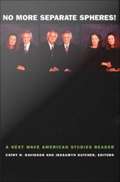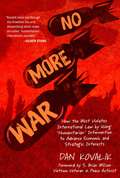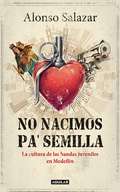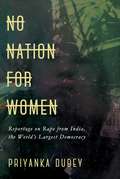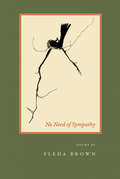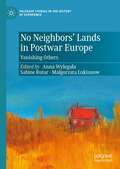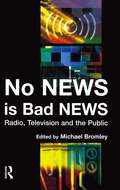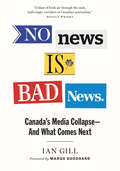- Table View
- List View
No Matter How Loud I Shout: A Year in the Life of Juvenile Court
by Edward HumesNow updated with a new introduction and afterword, this award-winning examination of the nation's largest juvenile criminal justice system in Los Angeles by a Pulitzer Prize-winning journalist is "an important book with a message of great urgency, especially to all concerned with the future of America's children" (Booklist).In an age when violence and crime by young people is again on the rise, No Matter How Loud I Shout offers a rare look inside the juvenile court system that deals with these children and the impact decisions made in the courts had on the rest of their lives. Granted unprecedented access to the Los Angeles Juvenile Court, including the judges, the probation officers, and the children themselves, Edward Humes creates an unforgettable portrait of a chaotic system that is neither saving our children in danger nor protecting us from adolescent violence. Yet he shows us there is also hope in the handful of courageous individuals working tirelessly to triumph over seemingly insurmountable odds. Weaving together a poignant, compelling narrative with razor-sharp investigative reporting, No Matter How Loud I Shout is a convincingly reported, profoundly disturbing discussion of the Los Angeles juvenile court's failings, providing terrifying evidence of the system's inability to slow juvenile crime or to make even a reasonable stab at rehabilitating troubled young offenders. Humes draws an alarming portrait of a judicial system in disarray.
No Mean Glasgow: Revelations of a Gorbals Guy
by Colin MacFarlaneIn his last book, The Real Gorbals Story, Colin MacFarlane detailed how he witnessed a once great area, home to wonderful characters and grand old buildings, disappear before his eyes. By the time MacFarlane's tenement was knocked down in the early 1970s, he had left school and been rehoused in another part of the city. In an attempt to extricate himself from his Gorbals gang days, he took a job as an apprentice chef at one of Glasgow's top restaurants, where he soon discovered that his colleagues were just as insane as those he had mixed with on the city streets. Meanwhile, MacFarlane struggled to integrate into the more affluent area that his family had been moved to and soon found himself returning to his old haunts and back in trouble again.In No Mean Glasgow, MacFarlane charts his eventful, fun-packed passage from Gorbals street boy to grown man on the brink of a new beginning. He describes his adventures with a mixture of humour, sadness and delight. It is a book for those people living all over the world who remember the old Glasgow - a city teeming with warmth, passion, patter and characters who could brighten up even the darkest of days.
No Meat Required: The Cultural History and Culinary Future of Plant-Based Eating
by Alicia KennedyA culinary and cultural history of plant-based eating in the United States that delves into the subcultures and politics that have defined alternative food.The vegan diet used to be associated only with eccentric hippies and tofu-loving activists who shop at co-ops and live on compounds. We&’ve come a long way since then. Now, fine-dining restaurants like Eleven Madison Park cater to chic upscale clientele with a plant-based menu, and Impossible Whoppers are available at Burger King. But can plant-based food keep its historical anti-capitalist energies if it goes mainstream? And does it need to?In No Meat Required, author Alicia Kennedy chronicles the fascinating history of plant-based eating in the United States, from the early experiments in tempeh production undertaken by the Farm commune in the 70s to the vegan punk cafes and anarchist zines of the 90s to the chefs and food writers seeking to decolonize vegetarian food today.Many people become vegans because they are concerned about the role capitalist food systems play in climate change, inequality, white supremacy, and environmental and cultural degradation. But a world where Walmart sells frozen vegan pizzas and non-dairy pints of ice cream are available at gas stations – raises distinct questions about the meanings and goals of plant-based eating.Kennedy—a vegetarian, former vegan, and once-proprietor of a vegan bakery—understands how to present this history with sympathy, knowledge, and humor. No Meat Required brings much-needed depth and context to our understanding of vegan and vegetarian cuisine, and makes a passionate argument for retaining its radical heart.
No Mercy Here: Gender, Punishment, and the Making of Jim Crow Modernity (Justice, Power, and Politics)
by Sarah HaleyIn the late nineteenth and early twentieth centuries imprisoned black women faced wrenching forms of gendered racial terror and heinous structures of economic exploitation. Subjugated as convict laborers and forced to serve additional time as domestic workers before they were allowed their freedom, black women faced a pitiless system of violence, terror, and debasement. Drawing upon black feminist criticism and a diverse array of archival materials, Sarah Haley uncovers imprisoned women's brutalization in local, county, and state convict labor systems, while also illuminating the prisoners' acts of resistance and sabotage, challenging ideologies of racial capitalism and patriarchy and offering alternative conceptions of social and political life.A landmark history of black women's imprisonment in the South, this book recovers stories of the captivity and punishment of black women to demonstrate how the system of incarceration was crucial to organizing the logics of gender and race, and constructing Jim Crow modernity.
No Mexicans, Women, or Dogs Allowed: The Rise of the Mexican American Civil Rights Movement
by Cynthia E. Orozco“A refreshing and pathbreaking [study] of the roots of Mexican American social movement organizing in Texas with new insights on the struggles of women” (Devon Peña, Professor of American Ethnic Studies, University of Washington).Historian Cynthia E. Orozco presents a comprehensive study of the League of United Lantin-American Citizens, with an in-depth analysis of its origins. Founded by Mexican American men in 1929, LULAC is often judged harshly according to Chicano nationalist standards of the late 1960s and 1970s. Drawing on extensive archival research, No Mexicans, Women, or Dogs Allowed presents LULAC in light of its early twentieth-century context.Orozco argues that perceptions of LULAC as an assimilationist, anti-Mexican, anti-working class organization belie the group's early activism. Supplemented by oral history, this sweeping study probes LULAC's predecessors, such as the Order Sons of America, blending historiography and cultural studies. Against a backdrop of the Mexican Revolution, World War I, gender discrimination, and racial segregation, No Mexicans, Women, or Dogs Allowed recasts LULAC at the forefront of civil rights movements in America.
No Mexicans, Women, or Dogs Allowed: The Rise of the Mexican American Civil Rights Movement
by Cynthia E. Orozco“A refreshing and pathbreaking [study] of the roots of Mexican American social movement organizing in Texas with new insights on the struggles of women” (Devon Peña, Professor of American Ethnic Studies, University of Washington).Historian Cynthia E. Orozco presents a comprehensive study of the League of United Lantin-American Citizens, with an in-depth analysis of its origins. Founded by Mexican American men in 1929, LULAC is often judged harshly according to Chicano nationalist standards of the late 1960s and 1970s. Drawing on extensive archival research, No Mexicans, Women, or Dogs Allowed presents LULAC in light of its early twentieth-century context.Orozco argues that perceptions of LULAC as an assimilationist, anti-Mexican, anti-working class organization belie the group's early activism. Supplemented by oral history, this sweeping study probes LULAC's predecessors, such as the Order Sons of America, blending historiography and cultural studies. Against a backdrop of the Mexican Revolution, World War I, gender discrimination, and racial segregation, No Mexicans, Women, or Dogs Allowed recasts LULAC at the forefront of civil rights movements in America.
No, mi general
by Irene Lozano Zaida CanteraLa capitán Zaida había sido preparada para combatir en cualquier guerra. Lo que nunca imaginó es que el enemigo estaría en sus propias filas. «La capitán Zaida era brillante, honesta y leal, pero se permitió un único error: no callarse ante una injusticia. En el Ejército, si te atreves a denunciar a un superior, aunque tengas razón, antes o después acabas perdiendo.» Jordi Évole Después de seis años de persecución inmisericorde, la hoy comandante Zaida Cantera de Castro ha decidido romper su silencio superando el miedo cerval que muchos militares tienen a hablar. Su estremecedor relato, escrito por Irene Lozano, cuenta la experiencia brutal y traumática de ser acosada sexualmente primero, y perseguida laboral, profesional y personalmente después, a modo de escarmiento, por aquellos que tendrían que haberla protegido. Reseñas: «Una mujer muy valiente. Mucho.» Ana Pastor «Lectura muy recomendable.» Nativel Preciado «Enhorabuena a Zaida Cantera por la capacidad de comunicación y convicción. El Ejército se pierde un buen mando, el acosador, sigue.» Julia Otero «Sus acosadores siguen dentro. Ella ha conseguido la baja. Algo no funciona.» Jordi Évole. «Zaida Cantera se ha convertido en el símbolo de la explosión de la burbuja de hermetismo en la que se encontraban las Fuerzas Armadas.» Diario Público #Zaida «Creo que es la primera vez que un militar se atreve a contar su historia aportando nombres y apellidos de "compañeros" en activo para poner caras a los culpables. Lo hago, en primer lugar, porque creo que hay que denunciar a los responsables, porque hay muchos militares honrados dejándose la piel, y hay que diferenciarlos. En segundo lugar, porque no todos somos iguales como se ha demostrado. No lo somos ante la ley, lo que es lamentable, pero tampoco lo somos ante la corrupción, el caciquismo, el servilismo...» Zaida Cantera de Castro
No Milk Today: The Vanishing World of the Milkman
by Andrew WardTraditionally, in British society, the milkman has been a family friend, a sex symbol and a cheerful chappie. He has been the eyes and ears of the community, and his genetic legacy has supposedly passed into the lineage of housewives.This collection of folk tales about milkmen covers the history of the job and the milkman's everyday experience. The book is structured by the milkman's working day. It starts with the alarm-clock and ends with the milkman returning home in search of sustenance and tender loving care. The book is less about changes in the dairy industry and more about the work experiences of the people who have delivered milk. Many milkmen are featured: Chris Frankland delivered over eight million pints before he retired at seventy-four; Alistair Maclean drove two million miles across the north coast of Scotland in fifty years; and Tony Fowler, an award-winning Leicestershire milkman, helped to put over fifty people in prison.For more than thirty years the author has collected milkman stories through oral testimony, newspaper archives, anecdotes, diaries, books and more formal interviews.
No Milk Today: The Vanishing World of the Milkman
by Andrew WardTraditionally, in British society, the milkman has been a family friend, a sex symbol and a cheerful chappie. He has been the eyes and ears of the community, and his genetic legacy has supposedly passed into the lineage of housewives.This collection of folk tales about milkmen covers the history of the job and the milkman's everyday experience. The book is structured by the milkman's working day. It starts with the alarm-clock and ends with the milkman returning home in search of sustenance and tender loving care. The book is less about changes in the dairy industry and more about the work experiences of the people who have delivered milk. Many milkmen are featured: Chris Frankland delivered over eight million pints before he retired at seventy-four; Alistair Maclean drove two million miles across the north coast of Scotland in fifty years; and Tony Fowler, an award-winning Leicestershire milkman, helped to put over fifty people in prison.For more than thirty years the author has collected milkman stories through oral testimony, newspaper archives, anecdotes, diaries, books and more formal interviews.
No More Heroes: Grassroots Challenges to the Savior Mentality
by Jordan FlahertyMissionaries of the left, saviors are people of privilege who believe they have all the answers. They want to help, but don't want to listen; they lead but never follow. From post-Katrina New Orleans, to anti-sex-traficking work, to do-gooder journalists, Flaherty's book reveals saviors' misdeeds but also shows how activists can build new, stronger movements.
No More Knives
by Chuck KlostermanOriginally collected in Chuck Klosterman IV and now available both as a stand-alone essay and in the ebook collection Chuck Klosterman on Pop, this essay is about Radiohead.
No More Lies: The Myth and Reality of American History
by Dick GregoryRepublished as part of Amistad’s Literary Revival Program, the groundbreaking, bestselling look at history from the perspective of African Americans: an essential classic that continues to speak to us today, written by the voice of black consciousness, Dick Gregory—the incomparable satirist, human rights and environmental activist, health advocate, social justice champion, and NAACP Image Award–winning author.In 1972, during the Black Power Movement, iconoclast Dick Gregory challenged one of the foundations of America itself—its history, which had been written almost exclusively from the white male perspective. In No More Lies, this true trailblazer gave voice to African Americans, speaking their truth about the past and race relations in the United States.No More Lies offers this incomparable satirist’s intellectual, conspiratorial, and humorous spin on the facts. No subject is off limits from his critical eye—Gregory examines numerous aspects of culture and history, from the slave trade, police brutality, the wretchedness of working-class life and labor unions to the 1968 Civil Rights Act, the Founding Fathers, “happy slaves,” and entrepreneurs. Although this absorbing book is more than forty years old, its provocative truths continue to reverberate in our lives today. With No More Lies, Gregory inspire a new generation to connect what is happening today with what has happened in the past.
No More Nice Girls: Gender, Power, and Why It’s Time to Stop Playing by the Rules
by Lauren McKeonA groundbreaking, insightful book about women and power from award-winning journalist Lauren McKeon, which shows how women are disrupting the standard (very male) vision of power, ditching convention, and building a more equitable world for everyone. In the age of girl bosses, Beyoncé, and Black Widow, we like to tell our little girls they can be anything they want when they grow up, except they’ll have to work twice as hard, be told to “play nice,” and face countless double standards that curb their personal, political, and economic power. Women today remain a surprisingly, depressingly long way from gender and racial equality. It’s worth asking: Why do we keep playing a game we were never meant to win?Award-winning journalist and author of F-Bomb: Dispatches from the War on Feminism, Lauren McKeon examines the many ways in which our institutions are designed to keep women and other marginalized genders at a disadvantage. In doing so, she reveals why we need more than parity, visible diversity, and lone female CEOs to change this power game. She talks to people doing power differently in a variety of sectors and uncovers new models of power. And as the toxic, divisive, and hyper-masculine style of leadership gains ground, she underscores why it’s time to stop playing by the rules of a rigged game.
No More Nice Girls: Countercultural Essays
by Ellen WillisWith characteristic intelligence, wit, and feminist insight, Ellen Willis addresses democracy as she sees it: &“a commitment to individual freedom and egalitarian self-government in every area of social, economic, and cultural life.&” Moving between scholarly and down-to-earth activist writing styles, Willis confronts the conservative backlash that has slowly eroded democratic ideals and advances of the 1960s as well as the internal debates that have frequently splintered the left.
No More Peace: Abolition War and Counterrevolution
by Oliver BakerRacial capitalism is and was not inevitable. At every point in US history, the exploited and dispossessed rebelled for an alternative future. In No More Peace, Oliver Baker highlights how numerous insurrections, revolts, and armed campaigns of enslaved and colonized people advanced abolition war as the movement to win collective life over class society in North America. From this aim, abolition war became the motor force for constant white counterrevolution. This puts America's history of class struggles in a revealing new light. Through historical analysis, literary critique, and theory, Baker shows how Black and Indigenous rebels developed insights about counterrevolution precisely through their militant confrontation with it. Unearthing these critical insights, Baker shows how US capitalism was reproduced and expanded through the long history of white counterrevolution. Whiteness and settler colonialism developed as anti-Black and anti-Indigenous alliances formed across class difference to organize people to police or soldier for capitalism. In No More Peace, we relive moments of radical abolition and anticolonialism—particularly those of Nat Turner, Harriet Tubman, John Brown, and the Seminoles—that also ruptured counterrevolution. Slavery and settler colonialism were always uncertain projects—vulnerable to defeat, collapse, and ruin by those who resisted. Racial capitalism was always contingent.
No More Separate Spheres!: A Next Wave American Studies Reader
by Cathy N. Davidson Jessamyn HatcherNo More Separate Spheres! challenges the limitations of thinking about American literature and culture within the narrow rubric of "male public" and "female private" spheres from the founders to the present. With provocative essays by an array of cutting-edge critics with diverse viewpoints, this collection examines the ways that the separate spheres binary has malingered unexamined in feminist criticism, American literary studies, and debates on the public sphere. It exemplifies new ways of analyzing gender, breaks through old paradigms, and offers a primer on feminist thinking for the twenty-first century. Using American literary studies as a way to talk about changing categories of analysis, these essays discuss the work of such major authors as Catharine Sedgwick, Herman Melville, Pauline E. Hopkins, Frederick Douglass, Catharine Beecher, Ralph Waldo Emerson, W. E. B. Du Bois, Sarah Orne Jewett, Nathaniel Hawthorne, María Ampara Ruiz de Burton, Ann Petry, Gwendolyn Brooks, Cynthia Kadohata, Chang Rae-Lee, and Samuel Delany. No More Separate Spheres! shows scholars and students different ways that gender can be approached and incorporated into literary interpretations. Feisty and provocative, it provides a forceful analysis of the limititations of any theory of gender that applies only to women, and urges suspicion of any argument that posits "woman" as a universal or uniform category. By bringing together essays from the influential special issue of American Literature of the same name, a number of classic essays, and several new pieces commissioned for this volume, No More Separate Spheres! will be an ideal teaching tool, providing a key supplementary text in the American literature classroom. Contributors. José F. Aranda, Lauren Berlant, Cathy N. Davidson, Judith Fetterley, Jessamyn Hatcher, Amy Kaplan, Dana D. Nelson, Christopher Newfield, You-me Park, Marjorie Pryse, Elizabeth Renker, Ryan Schneider, Melissa Solomon, Siobhan Somerville, Gayle Wald , Maurice Wallace
No More War: How the West Violates International Law by Using 'Humanitarian' Intervention to Advance Economic and Strategic Interests
by Dan Kovalik"Kovalik helps cut through the Orwellian lies and dissembling which make so-called 'humanitarian' intervention possible." —Oliver Stone War is the fount of all the worst human rights violations―including genocide―and not its cure. This undeniable truth, which the framers of the UN Charter understood so well, is lost in today&’s obsession with the oxymoron known as &“humanitarian" intervention.No More War: How the West Violates International Law by Using 'Humanitarian' Intervention to Advance Economic and Strategic Interests sets out to reclaim the original intent of the Charter founders to end the scourge of war on the heels of the devastation wrought by WWII. The book begins with a short history of the West&’s development as built upon the mass plunder of the Global South, genocide and slavery, and challenges the prevailing notion that the West is uniquely poised to enforce human rights through force. This book also goes through recent &“humanitarian" interventions carried out by the Western powers against poorer nations (e.g., in the DRC, Congo, and Iraq) and shows how these have only created greater human rights problems – including genocide – than they purported to stop or prevent.No More War reminds the reader of the key lessons of Nuremberg – that war is the primary scourge of the world, the root of all the evils which international law seeks to prevent and eradicate, and which must be prevented. The reader is then taken through the UN Charter and other human rights instruments and their emphasis on the prevention of aggressive war.
No nacimos pa' semilla
by Alonso SalazarUno de los libros más vendidos de Alonso Salazar. Lectura obligada para entender el surgimiento de la violencia urbana en Colombia. Este libro revela el mundo de los jóvenes que asociados en bandas han estremecido a Colombia con sus acciones temerarias. También, se descubren las raíces históricas y culturales de una generación que, entrelazada con el fenómeno del narcotráfico, gestó una subcultura con formas peculiares de religiosidad, lenguajes profanos y una actitud desafiante ante la muerte. Alonso Salazar (quien se convirtiera unos años después en el alcalde de Medellín) describe a través de varios personajes la dura vida de los jóvenes sicarios y de los habitantes de los barrios más marginados de la ciudad. Usa un lenguaje propio de estos grupos, el cual hoy, casi treinta años después, ha permeado la sociedad en general, lo que tal vez es una señal de cuánto la violencia nos ha marcado.
No Nation for Women: Ground Reportage on Rape from the World's Largest Democracy
by Priyanka DubeyNo Nation for Women takes a hard, close look at what makes India unsafe for its women — from custodial rapes and honour killings to rapes of minors and trafficking — the author uncovers many unpalatable truths behind what we are familiar with as newspaper headlines only... Numbers convey, in part, why India is referred to as one of the world’s rape capitals — one woman is raped every 15 minutes; and, in 50 years, there has been a staggering rise of 873 per cent in sexual crimes against girls. And beyond the numbers and statistics, there are stories, often unreported — of women in Damoh, Madhya Pradesh, who are routinely raped if they spurn the advances of men; of girls from de-notified tribes in central India who have no recourse to justice if sexually violated; of victimized lower-caste girls in small-town Baduan, Uttar Pradesh; of frequent dislocation faced by survivor families in West Bengal; of political wrath turning into rape in Tripura. Priyanka Dubey travels through large swathes of India, over a period of six years, to uncover the accounts of disenfranchised women who are caught in the grip of patriarchy and violence. She asks if, after the globally reported December 2012 gang-rape of ‘Nirbhaya’ in New Delhi, India’s gender narrative has shifted — and, if it hasn’t, what needs to be done to make this a nation worthy of its women.
No Need of Sympathy (American Poets Continuum)
by Fleda BrownNo Need of Sympathy is an exceptionally wide-ranging poetry collection, touching on contemporary science, physics, family, politics, and the natures of poetry and reality. These poems, the eighth collection by Fleda Brown, ask huge questions; they zero in like a microscope on what’s here, at hand. They are spoken with humility, great humor, curiosity, and a deep love of living.
No Need of Sympathy
by Fleda BrownNo Need of Sympathy is an exceptionally wide-ranging poetry collection, touching on contemporary science, physics, family, politics, and the natures of poetry and reality. These poems, the eighth collection by Fleda Brown, ask huge questions; they zero in like a microscope on what's here, at hand. They are spoken with humility, great humor, curiosity, and a deep love of living.
No Neighbors’ Lands in Postwar Europe: Vanishing Others (Palgrave Studies in the History of Experience)
by Anna Wylegała Sabine Rutar Małgorzata ŁukianowThis book focuses on the social voids that were the result of occupation, genocide, mass killings, and population movements in Europe during and after the Second World War. Historians, sociologists, and anthropologists adopt comparative perspectives on those who now lived in ‘cleansed’ borderlands. Its contributors explore local subjectivities of social change through the concept of ‘No Neighbors’ Lands’: How does it feel to wear the dress of your murdered neighbor? How does one get used to friends, colleagues, and neighbors no longer being part of everyday life? How is moral, social, and legal order reinstated after one part of the community participated in the ethnic cleansing of another? How is order restored psychologically in the wake of neighbors watching others being slaughtered by external enemies? This book sheds light on how destroyed European communities, once multi-ethnic and multi-religious, experienced postwar reconstruction, attempted to come to terms with what had happened, and negotiated remembrance.
No News is Bad News: Radio, Television and the Public
by Michael BromleyThis volume of collected essays provides a wide-ranging survey of the state of radio and television, especially the idea of public service broadcasting, and of news, current affairs and documentary programming in America, Australia, the UK and the rest of western Europe. Among the key issues it addresses are the 'dumbing down' of TV news, the infotainment factor in current affairs shows and the disappearance of the documentary. Using contemporary cases and examples - from the row over the scheduling of News at Ten in the UK to the creation of ABC News Online in Australia -- the essays link the performance of radio and television at the turn of the millennium with the processes of deregulation, liberalisation and digitalisation which have been evident since the 1980s. Working from a much needed and original comparative approach which encompasses complex and well-established public broadcasting in the USA as well as emerging and vulnerable participatory radio stations in El Salvador, the book sets a variety of experiences of factual radio and television programming within wider political and cultural contexts. It offers analyses of not only the 'problems' associated with news, current affairs and documentary broadcasting in an era of a declining public service ethos and the apparent triumph of the market, however. The essays also explore the potential of alternative radio and television, new forms of communication, such as the internet, and changing practices among journalists and programme makers, as well as the resilience of public broadcasting and the powers of the public to ensure that the media remain relevant and accountable. A companion text to the bestselling Sex, Lies and Democracy: The Press and the Public, this volume presents a multi-faceted approach to the tumultuous present and the uncertain future of news, current affairs and documentary in radio and television.
No News Is Bad News: Canada's Media Collapse - and What Comes Next
by Ian GillCanada's media companies are melting faster than the polar ice caps, and in No News Is Bad News, Ian Gill chronicles their decline in a biting, in-depth analysis. He travels to an international journalism festival in Italy, visits the Guardian in London, and speaks to editors, reporters, entrepreneurs, investors, non-profit leaders, and news consumers from around the world to find out what's gone wrong. Along the way he discovers that corporate concentration and clumsy adaptations to the digital age have left Canadians with a gaping hole in our public square. And yet, from the smoking ruins of Canada's news industry, Gill sees glimmers of hope, and brings them to life with sharp prose and trenchant insights.
